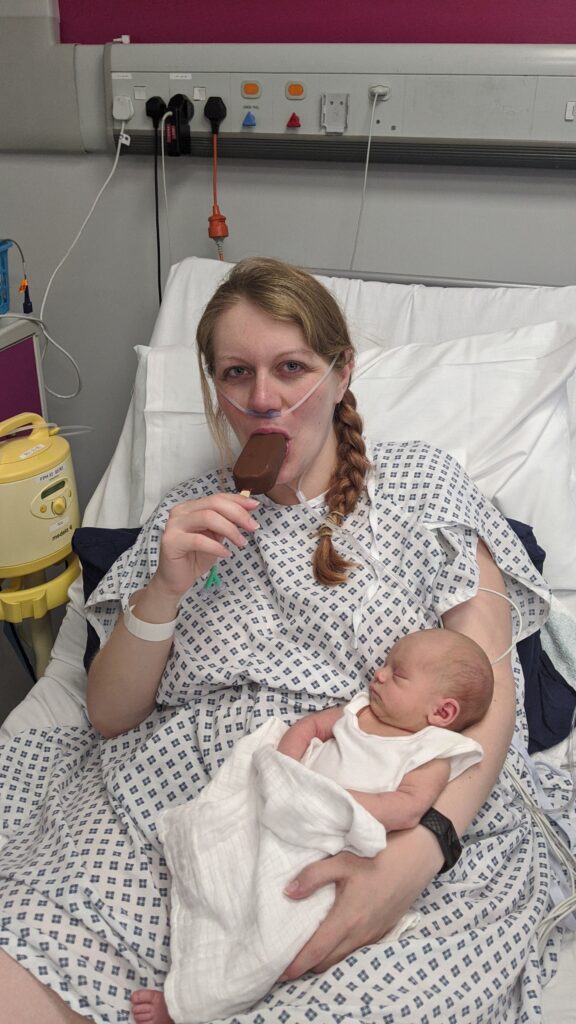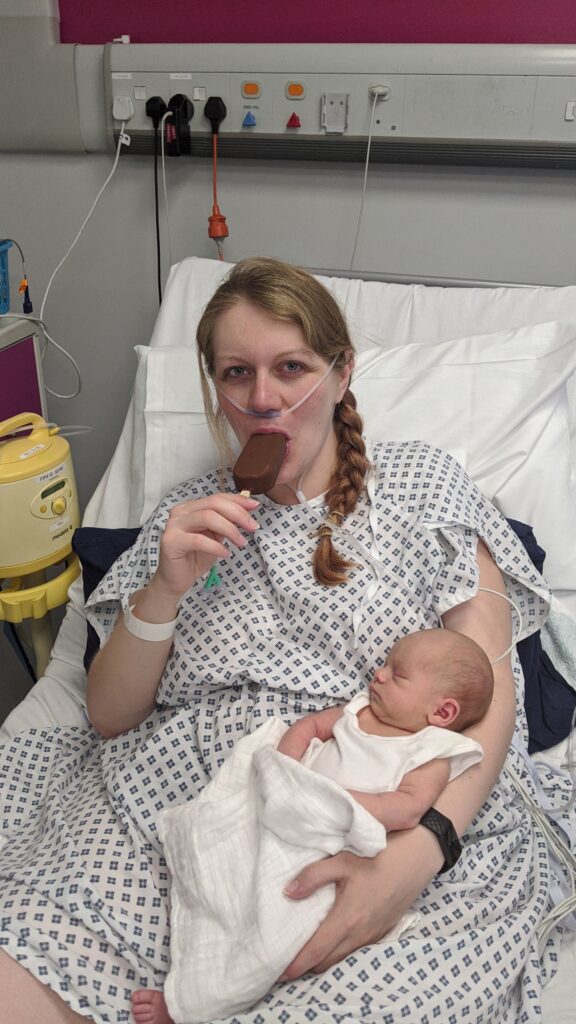I recently spoke with an old colleague of mine, Angharad. She shared her story with me and I asked her to share it with you to raise awareness.
Peripartum cardiomyopathy (PPCM) is a rare type of heart failure. It can occur during pregnancy or up to 5 months after giving birth. The condition causes the heart to become enlarged and weakened. As a result, the heart can’t pump blood properly to the rest of the body.
At the start of my third trimester, I rapidly put on a lot of weight, had swollen feet and ankles, occasional shortness of breath and felt very tired. I mentioned these symptoms at my regular midwife and consultant appointments (I had ovarian torsion and removal in my first trimester, so the hospital kept a close eye on me) and was told these were normal pregnancy symptoms and signs of anaemia I was taking iron tablets for.
I developed high blood pressure and pre-eclampsia towards the end of my pregnancy and was induced on my due date. After a very rapid labour (high blood pressure can cause a fast labour) my wonderful daughter Aliana was born, and I spent 2 days in hospital whilst my blood pressure was brought under control.
Aliana and I came home, and I continued to be very big and struggled with swollen feet and legs. I mentioned these symptoms to the midwife but was reassured these symptoms were normal. When Aliana was a week old, I was struggling to breastfeed her and had sudden shortness of breath, coughing and wheezing. I went to A&E and discovered my blood pressure was very high and my oxygen levels low. I was put on oxygen and had several tests to rule out a blood clot on my lungs (pulmonary embolism) and diagnose PPCM.

The tests included; an ECG (electrocardiogram) to check for an abnormal heart rhythm, a chest x-ray to look for fluid on the lungs, an echocardiogram – similar to a pregnancy ultrasound scan, to look at heart function, a CT scan and a coronary angiogram. The angiogram looks at the blood supply to the heart and checks that the arteries are not narrowed or blocked. It was very hot when I was admitted to hospital and the air conditioning in the angiogram room almost made it enjoyable!
The tests resulted in a diagnosis of heart failure and water on the lungs. The tests showed that the left side of my heart was enlarged, the ejection fraction (percentage of blood leaving your heart each time it squeezes) was 40% (normal is between 55% and 70%) and I displayed the symptoms of heart failure.
This had been caused by the swelling and high blood pressure causing my lungs to fill up with water and this had a knock-on effect on my heart. I spent 4 days on the Cardiac ward and had 6 litres of fluid drained from me. With medication and rest I made a full recovery in 4 months; however, the experience has been a mental strain and I struggle with postnatal depression, anxiety and PTSD.

PPCM is rare and effects around 1 in every 2000 women who give birth. Although it can affect any woman who is pregnant, it is more common in those who are over 30, overweight, have had previous children, or a history of high blood pressure.

Cardiovascular disease is the leading cause of maternal deaths in the UK and treatment is generally a combination of medication and rest.
The medication used is generally a combination of diuretics (water tablets) to reduce the build-up of fluid on the lungs and ankles, Beta-blockers to slow the heart rate and reduce the force at which blood is pumped around the body and ACE inhibitors to relax the muscle around the blood vessels making it easier for the heart to work. In most cases and 70% of women have recovered 12 months after diagnosis, however, they may take medication for the rest of their lives. Occasionally, the heart does not fully recover and a pacemaker or heart transplant is required.
PPCM can be mild or severe and is difficult to diagnose, as symptoms, such as tiredness and swollen feet and ankles, are common in pregnancy. Other symptoms include shortness of breath, racing heartbeat, chest pain and rapid weight gain.
Visit Cardiomyopathy UK for more information or check out Pumping Marvellous’ Guide to PPCM.

